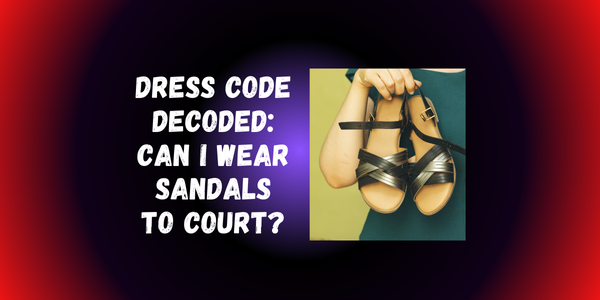Wearing sandals to court is generally not advisable. Courts often expect formal attire, including closed-toe shoes.
Dressing appropriately for court is crucial. Your appearance can influence how seriously the judge and jury take you. Courts maintain a formal atmosphere, reflecting their significance in legal matters.
Proper attire shows respect for the judicial system. While comfort is essential, prioritizing professionalism is key when choosing your outfit.
Sandals may be perceived as too casual, undermining your credibility. Opting for closed-toe shoes not only aligns with court expectations but also conveys a sense of seriousness.
Understanding dress codes can help you navigate court appearances with confidence. Always strive to present yourself in a manner that reflects the importance of the proceedings.
First Impressions Matter: The Courtroom Setting
The courtroom is a serious place. First impressions can influence outcomes. Your appearance sends a message to judges and jurors. Choosing the right attire is crucial. Sandals may not create the best impression.
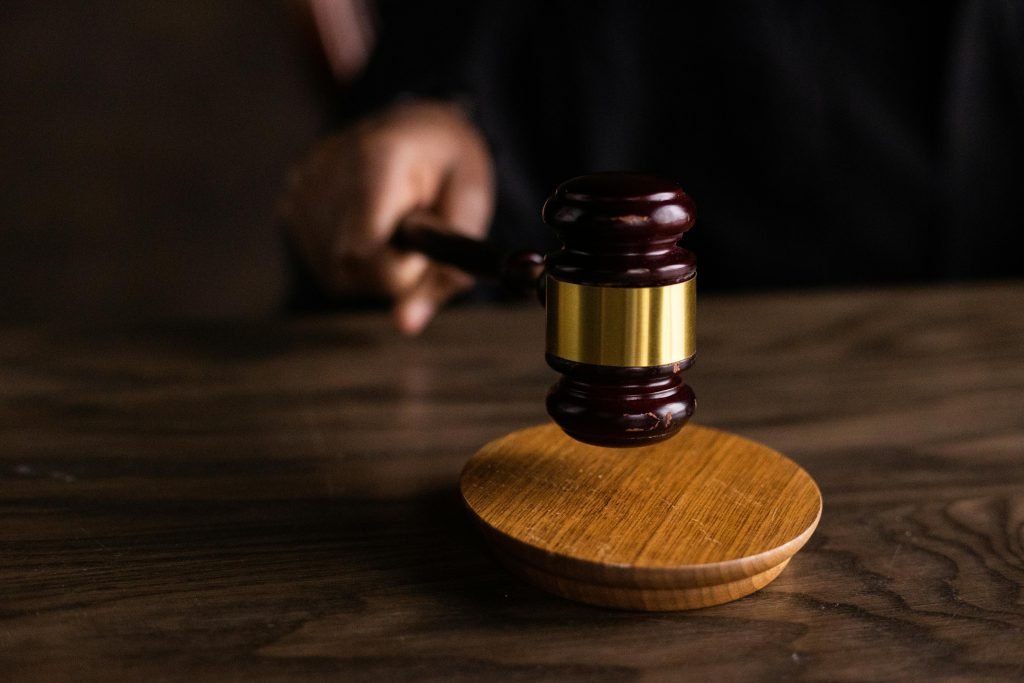
The Role Of Appearance
How you present yourself in court speaks volumes before you even say a word. In the formal environment of a courtroom, appearance is often seen as a reflection of your attitude towards the judicial process. Dressing thoughtfully demonstrates respect, seriousness, and a clear understanding of courtroom expectations.
Wearing formal attire shows that you recognize the importance of the proceedings. A neat and professional look can help create a positive impression, suggesting that you are responsible, prepared, and respectful of the court’s authority. Judges, jurors, attorneys, and other courtroom personnel are all observing, often forming subconscious opinions based on how individuals present themselves.
Conversely, casual clothing, especially overly relaxed items like sandals, tank tops, or jeans, can convey a lack of seriousness. It may suggest to the court that you do not respect the gravity of the situation, whether you are appearing for a minor hearing or a significant trial. Even if your case is informal, dressing casually can work against you.
Courts universally expect a certain level of decorum from anyone who appears before them — whether defendants, plaintiffs, witnesses, or spectators. This expectation is rooted in tradition, and adhering to it demonstrates your understanding of courtroom etiquette and your regard for the legal system.
Making the effort to dress appropriately not only reflects personal dignity but also helps reinforce the solemn nature of the judicial process. Taking this simple step can subtly influence the way your case is perceived — and possibly its outcome.
Understanding Courtroom Formality
Courtrooms have specific dress codes. Each court may have different rules. Understanding these rules is important. Here’s a quick overview:
| Type of Court | Dress Code |
|---|---|
| Criminal Court | Formal attire recommended |
| Civil Court | Business casual acceptable |
| Family Court | Respectful attire required |
Wearing sandals may not fit these guidelines. Consider your attire carefully. Always aim for a polished look. It can impact your case significantly.
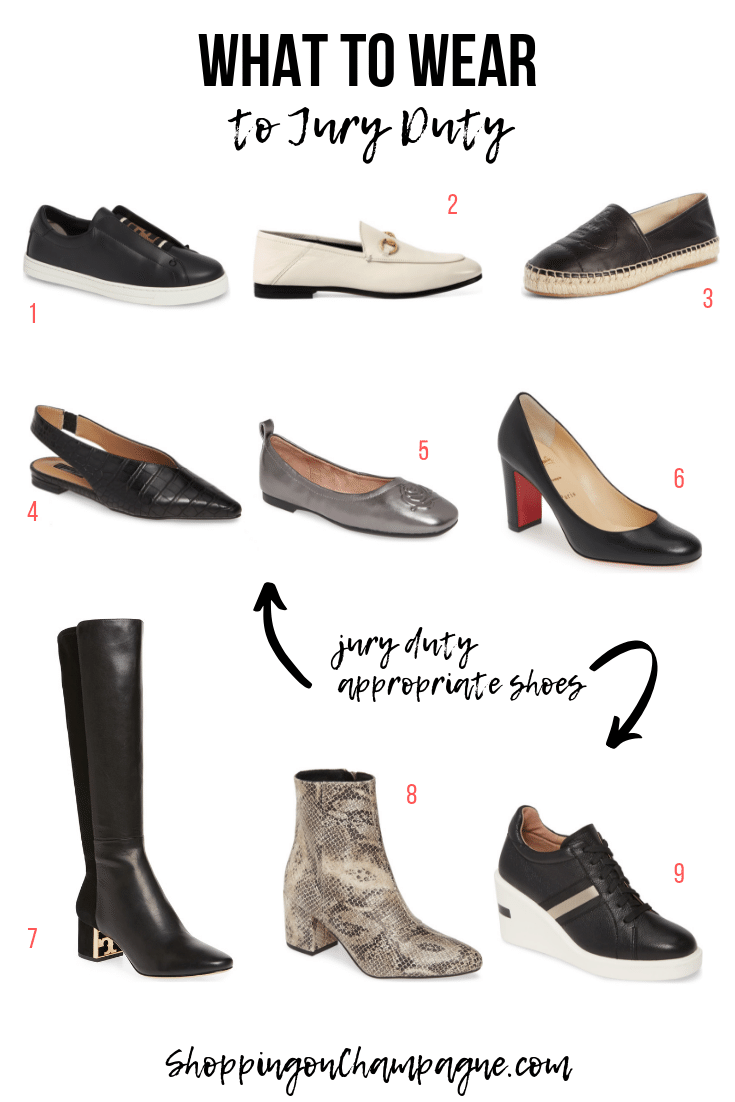
Credit: www.shoppingonchampagne.com
Decoding The Dress Code: What’s Acceptable
Understanding the court’s dress code is essential for your appearance. Attire reflects respect for the judicial process. Many wonder: Can I wear sandals to court? Let’s explore what is acceptable.
General Guidelines
Most courts require formal attire. This shows respect for the law. Here are some general guidelines:
- Wear business casual or formal clothes.
- Choose closed-toe shoes over sandals.
- Avoid shorts, tank tops, and ripped jeans.
- Dress in neutral or dark colors.
Sandals may be seen as too casual. Closed shoes are safer choices.
Exceptions And Variations
Some courts may have lenient rules. Here are a few exceptions:
| Situation | Acceptable Attire |
|---|---|
| Informal hearings | Smart sandals may be acceptable. |
| Hot weather | Dressy sandals can be worn if appropriate. |
| Special cases (like family court) | Casual attire may be allowed. |
Check local court rules. Dress codes may vary by location.
The Debate: Sandals In Court
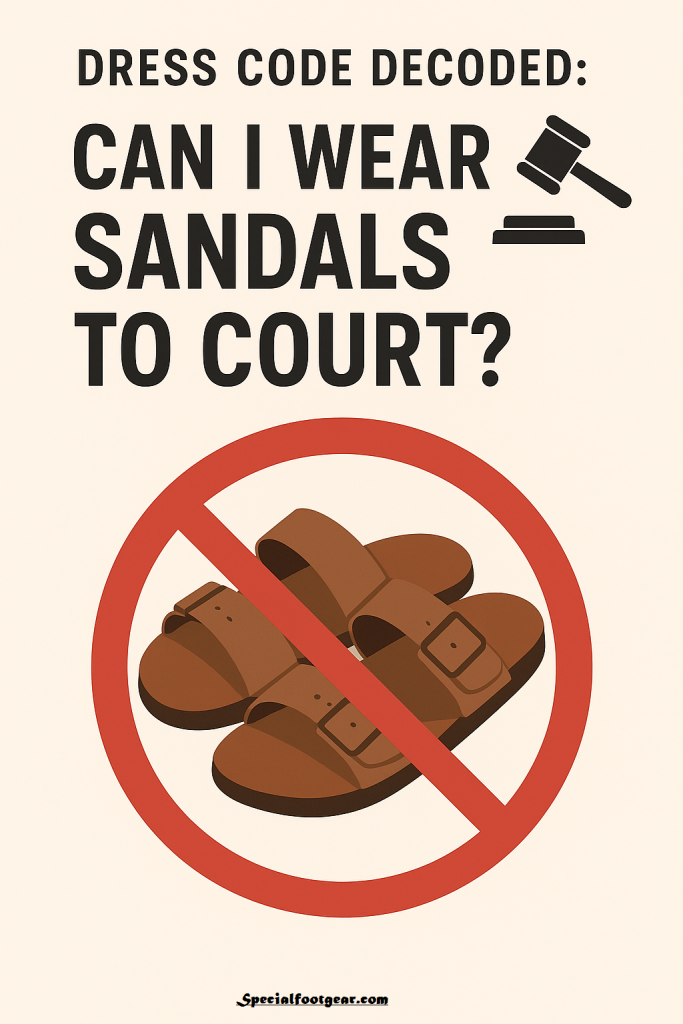
The question of wearing sandals to court stirs strong opinions. Many believe footwear reflects respect for the legal system. Others argue comfort should come first. Understanding both sides can help you decide.
Pros And Cons
| Pros | Cons |
|---|---|
| Breathable and comfortable. Easy to slip on and off. Casual look may ease anxiety. | May seem disrespectful to the court. Can appear unprofessional. Not suitable for formal settings. |
Real-life Incidents
Many stories highlight the importance of appropriate attire. One lawyer wore sandals to a hearing. The judge remarked on the lack of professionalism. This created a negative impression.
Another case involved a defendant in casual flip-flops. The jury noticed. They may have questioned the seriousness of the case.
Such incidents reveal how footwear can impact perceptions. Choosing the right shoes is crucial for court appearances.
Why Footwear Matters: More Than Just Fashion
When attending court, your footwear choice holds much more significance than simply complementing your outfit. Shoes are a powerful part of your overall appearance, subtly communicating your attitude, level of preparation, and respect for the courtroom’s formal atmosphere. In legal settings, where impressions can matter just as much as evidence and argument, wearing the right shoes can influence how judges, jurors, and attorneys perceive you.
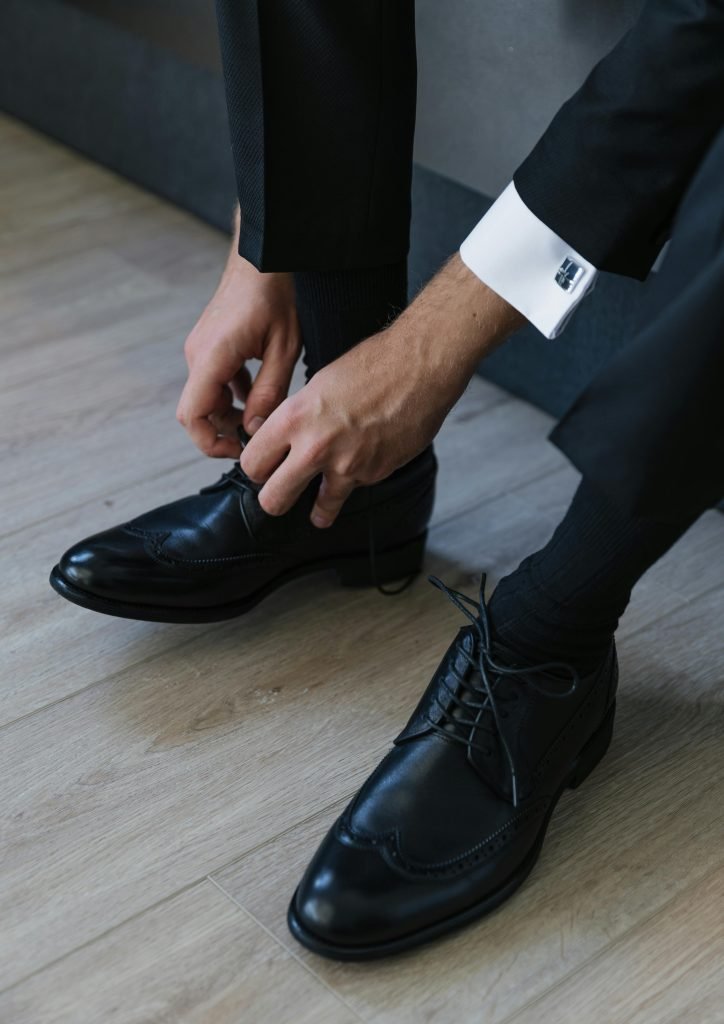
Your footwear speaks before you do. Clean, professional, and appropriate shoes send a signal that you take the proceedings seriously. In contrast, casual or inappropriate footwear, like flip-flops or worn-out sandals, may suggest a lack of concern or disrespect for the process. The choice between a polished pair of dress shoes and casual sandals could potentially affect the tone of your courtroom experience.
Symbolism Of Shoes
Footwear carries a deep symbolic weight in many professional and formal environments — and the courtroom is no exception. Here’s what your shoes might silently communicate:
- Professionalism: Wearing traditional dress shoes demonstrates that you understand the gravity of the setting. They show that you prepared thoughtfully and recognize the importance of presenting yourself properly.
- Respect: Shoes that are well-maintained and appropriate for formal settings send a strong message of respect — not just for the judge and jury, but for the legal process itself.
- Confidence: Polished, stylish shoes can also boost your own confidence. When you feel put together, you’re more likely to present yourself calmly, clearly, and persuasively.
Ignoring footwear might seem like a small oversight, but in a courtroom where every detail can shape perceptions, it’s a risk not worth taking.
Practical Considerations
Beyond symbolism, there are practical reasons why your choice of shoes matters in a courtroom setting:
- Dress Code Compliance: Many courts have explicit or implicit expectations regarding attire. Closed-toe, formal shoes align with most courthouse dress codes, reducing the risk of being admonished or making a poor impression.
- Weather Appropriateness: Practical footwear also means considering the weather. For example, sandals on a cold, rainy day not only look out of place but can also make you uncomfortable and distracted during proceedings.
- Noise Control: Loud, squeaky, or hard-soled shoes can disrupt the quiet environment of a courtroom. Shoes that make minimal noise help maintain decorum and prevent unnecessary distractions.
In essence, your footwear serves both functional and symbolic roles during a court appearance. It supports the image you present and can either reinforce or detract from the seriousness of your case. Making a thoughtful choice is a simple yet powerful way to respect the court and strengthen your position.
Navigating The Grey Area: When Sandals Might Be Okay
While it is generally recommended to avoid wearing sandals to court, there are occasional exceptions where sandals might be considered acceptable. These situations are rare and depend heavily on the specific court’s expectations, local customs, and even the presiding judge’s personal discretion. Understanding when and how sandals might be tolerated can help you make a more informed decision and avoid missteps that could affect your appearance in court.
Even in these instances, it’s essential to prioritize clean, conservative styles and to avoid overly casual footwear like flip-flops or heavily worn sandals. Choosing a neat, professional-looking pair of sandals, if permitted, shows you still take the proceedings seriously.

Specific Scenarios
Here are a few particular circumstances where sandals might be viewed as acceptable:
- Short Appearances:
For brief, administrative matters such as arraignments, minor traffic violations, or procedural check-ins, courts may be more lenient regarding attire. Some individuals report successfully wearing neat sandals to quick hearings, especially when no formal trial or extended courtroom presence is required. However, even in these cases, it’s safer to opt for dressier sandals that cover more of the foot and are in good condition. - Summer Months:
In locations experiencing extreme heat during the summer, some courts may relax their dress codes slightly to account for the weather. Particularly in states known for hot climates, judges may exercise discretion and allow lighter footwear. That said, your sandals should still project a degree of professionalism—think leather dress sandals rather than beachwear. - Informal Settings:
Lower-stakes settings like small claims court or municipal traffic court sometimes exhibit a more casual atmosphere. Here, the expectation for formal dress might be a little looser compared to criminal or family courts. Still, appearances matter, and clean, conservative sandals that resemble dress shoes in design are always a safer choice than casual flip-flops or slides.
Important Reminder
Even if you believe sandals might be appropriate based on the type of hearing or the season, you should always check the specific court’s dress code beforehand. Many courts post their guidelines online or are happy to clarify dress expectations if you call ahead. Additionally, individual judges have broad authority over their courtrooms, and what is permissible in one courtroom may not be allowed in another.
When in doubt, err on the side of caution. Dressing slightly more formally than necessary is rarely frowned upon, but appearing too casual—especially with footwear—could harm your credibility in front of the judge.
Choosing The Right Type
Not all sandals are created equal. Selecting the right type matters. Consider these factors:
| Type of Sandal | Suitability |
|---|---|
| Flip-Flops | Generally not acceptable. |
| Dress Sandals | Often acceptable if neat and clean. |
| Closed-Toe Sandals | More formal and usually appropriate. |
Choose sandals that look professional. Clean and polished options create a better impression.
Alternative Footwear: Making A Respectful Choice
Choosing the right footwear for court is essential. Your shoes reflect your respect for the court. Sandals may not always convey that respect. Consider other options that are both formal and comfortable.
Formal Options
Formal footwear sets the right tone. Here are some suitable choices:
- Dress Shoes: Classic and polished, ideal for court.
- Loafers: Comfortable yet professional, perfect for longer hearings.
- Oxfords: Timeless style, available in various colors.
- Flats: A good choice for women, stylish and comfortable.
Each option shows respect for the court. Avoid casual styles like sneakers and flip-flops.
Comfort Vs. Respect
Comfort is important, but respect is crucial. Choose footwear that balances both. Consider these points:
| Footwear Type | Comfort Level | Respect Level |
|---|---|---|
| Dress Shoes | Moderate | High |
| Loafers | High | High |
| Oxfords | Moderate | High |
| Flats | High | Moderate |
Choose options that feel good and show respect. Your footwear can impact your presence in court. Dress appropriately to make a positive impression.
Preparing For Court: A Comprehensive Checklist
Preparing for court requires careful planning. Proper attire shows respect for the legal process. Choosing the right outfit can influence first impressions. Sandals may not be the best choice. This checklist helps you make informed decisions.
Clothing
Your clothing sets the tone for your court appearance. Here are some tips:
- Dress appropriately: Opt for business casual or formal wear.
- Avoid distracting patterns: Choose solid colors or subtle designs.
- Wear long pants or skirts: Shorts are usually not acceptable.
- Choose closed-toe shoes: Sandals may look too casual.
Consider this table for a quick reference:
| Accepted Clothing | Clothing to Avoid |
|---|---|
| Dress pants | Shorts |
| Button-up shirts | T-shirts |
| Skirts | Tank tops |
| Closed-toe shoes | Flip-flops |
Accessories And More
Accessories should complement your outfit. Keep it simple and professional:
- Limit jewelry: Choose one or two pieces.
- Wear a watch: A classic look is always in style.
- Carry a simple bag: Avoid large handbags or backpacks.
- Grooming matters: Hair should be neat and tidy.
Here’s a quick checklist of must-haves:
- Properly fitting clothing
- Closed-toe shoes
- Minimal jewelry
- Simple bag
- Neat hairstyle
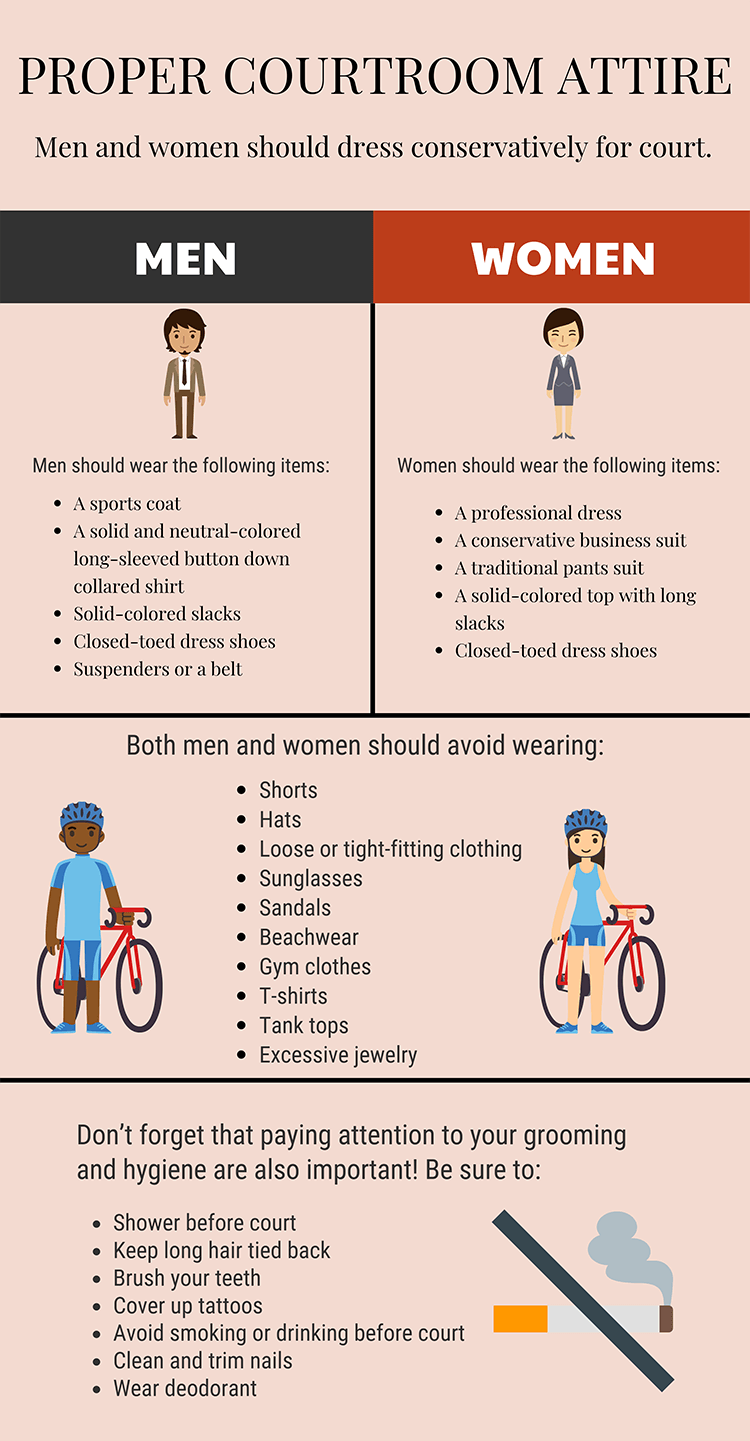
Credit: www.ericgjohnsonlaw.com
Learning From The Experts: Legal Professionals Weigh In
When it comes to courtroom appearances, few understand the expectations better than those who work within the legal system every day. Lawyers, judges, and courtroom staff consistently stress the importance of dressing appropriately — and that includes your choice of footwear. Listening to their advice can help you avoid common pitfalls and ensure you present yourself with the respect the court demands.
Advice From Lawyers
Lawyers, in particular, are quick to point out how significantly your clothing and shoes influence the first impression you make. Footwear is not just about comfort; it plays a meaningful role in how seriously the court takes you. Here are the key takeaways they often emphasize:
- Respect the Court:
Dressing respectfully shows that you recognize the authority of the court and the importance of the proceedings. Lawyers frequently remind clients that casual, careless attire can inadvertently suggest a lack of seriousness about the case. Dressing appropriately signals that you value the legal process and the judge’s time. - Opt for Closed-Toe Shoes:
Closed-toe shoes are almost always the safest and most appropriate option for any court appearance. They present a polished and formal look that aligns with courtroom etiquette. Attorneys routinely advise their clients to avoid footwear that exposes too much skin, as open-toed shoes and sandals can come across as disrespectful or overly casual. - Avoid Casual Styles:
Footwear typically associated with leisure activities — such as flip-flops, foam sandals, and beachwear — should never be worn to court. Lawyers caution that such choices may project an attitude of indifference, potentially harming the way a judge or jury perceives your credibility. - Consider Your Case:
The seriousness of your case should influence your attire decisions. For example, defendants in criminal matters are often encouraged to dress in formal business attire, including proper shoes, to convey a serious and respectful demeanor. Even for minor matters like traffic violations, attorneys advise dressing in a way that underscores your respect for the proceedings.
Ultimately, attorneys agree: it’s better to be slightly overdressed than underdressed in court. Making thoughtful choices — especially with footwear — demonstrates maturity, preparation, and respect for the judicial system.
Judges’ Perspectives
Judges have strong opinions on courtroom attire. Their insights can guide your choices:
| Judge’s Viewpoint | Comments |
|---|---|
| Professionalism | Judges appreciate a professional appearance. |
| First Impressions | Footwear contributes to the overall impression. |
| Case Context | Dress according to the nature of the case. |
Choosing the right shoes can impact your case. Follow the advice from experts.
Frequently Asked Questions
- Can I Wear Open-toed Shoes To Court?
Open-toed shoes are generally not recommended for court appearances, as they may be seen as too casual.
- What Types Of Shoes Are Appropriate For Court?
Dress shoes, loafers, or conservative flats are ideal choices for a court appearance, projecting professionalism and respect.
- Are Sandals Considered Professional Attire?
Most sandals are not considered professional attire and may be viewed as inappropriate in a courtroom setting.
- What Should I Avoid Wearing To Court?
Avoid casual clothing, flip-flops, and overly flashy accessories to maintain a respectful appearance in court.
- Can I Wear Sneakers To Court?
Sneakers are typically too casual for court; opt for more formal footwear to make a better impression.
Conclusion
Dressing appropriately for court is crucial. Sandals can be seen as too casual and may not create a favorable impression.
Opt for closed-toe shoes for a more professional look. Always prioritize respect for the courtroom setting. This choice can positively impact your case and how you are perceived by the judge.

